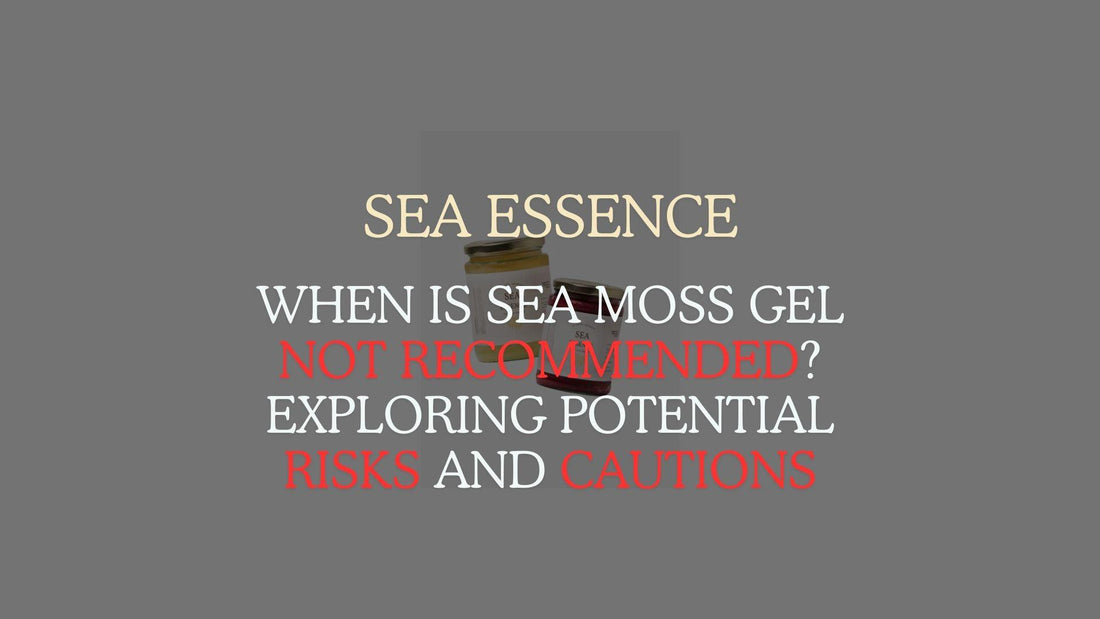
When is Sea Moss Gel Not Recommended? Exploring Potential Risks and Cautions
Sea moss gel, derived from the sea vegetable known as Irish moss, has gained popularity as a nutritional powerhouse due to its rich mineral content and potential health benefits. However, there are scenarios when its usage might not be suitable, and understanding these instances is crucial for responsible consumption.
When Not to Use Sea Moss?
Sea moss is generally safe for most individuals when consumed in moderation. However, certain situations may warrant caution or avoidance:

1. Iodine Sensitivity or Thyroid Disorders:
Sea moss is naturally high in iodine, which might pose risks for individuals with iodine sensitivity or thyroid conditions like hyperthyroidism. Excessive iodine intake could exacerbate these conditions, so consulting a healthcare professional before incorporating sea moss into the diet is essential.
2. Allergic Reactions:
Some individuals might be allergic to sea moss or other seaweeds. Symptoms can include skin irritation, digestive issues, or respiratory problems. If allergic reactions occur, discontinuing sea moss consumption is advisable.
3. Interaction with Medications:
Sea moss may interact with certain medications like blood thinners or medications for blood pressure, potentially affecting their efficacy. It's advisable to consult a healthcare provider before using sea moss gel if you're on prescribed medications.
When Should I Stop Taking Sea Moss?
Discontinuing sea moss consumption is recommended if adverse effects or allergic reactions are observed. Additionally, if you're undergoing medical treatments or experiencing unexpected health changes while using sea moss, it's prudent to pause its consumption and seek advice from a healthcare professional.
What Are the Negative Side Effects of Sea Moss Gel?
While sea moss is generally considered safe, excessive intake can lead to several side effects:

Digestive Issues:
Consuming large amounts of sea moss gel might cause digestive discomfort, such as bloating, gas, or diarrhea, due to its high fiber content.
Iodine Overconsumption:
Excessive iodine intake from sea moss can result in thyroid complications, including hyperthyroidism or hypothyroidism, especially in individuals with pre-existing thyroid disorders.
Heavy Metal Contamination:
Sea moss sourced from polluted waters might contain heavy metals like arsenic or lead, which can pose health risks when consumed regularly.
What Happens If I Eat Bad Sea Moss Gel?
Consuming spoiled or contaminated sea moss gel can lead to foodborne illnesses. Symptoms might include nausea, vomiting, abdominal pain, or diarrhea. It's crucial to store sea moss properly, ensuring it's clean and sourced from reputable suppliers to minimize contamination risks.
In conclusion, while sea moss gel offers numerous potential health benefits, its usage isn't suitable for everyone. Understanding the circumstances when caution is warranted is vital to prevent adverse effects and ensure safe consumption.
Before incorporating sea moss gel into your routine, consult with a healthcare professional, especially if you have underlying health conditions or are taking medications. It's crucial to prioritize safety and moderation when using sea moss to reap its potential benefits without encountering unwanted risks.
For further information on high-quality sea moss products, you can explore Sea Essence, a reputable source providing premium sea moss products.
Remember, making informed choices about dietary supplements like sea moss gel is pivotal for maintaining overall well-being and health.
